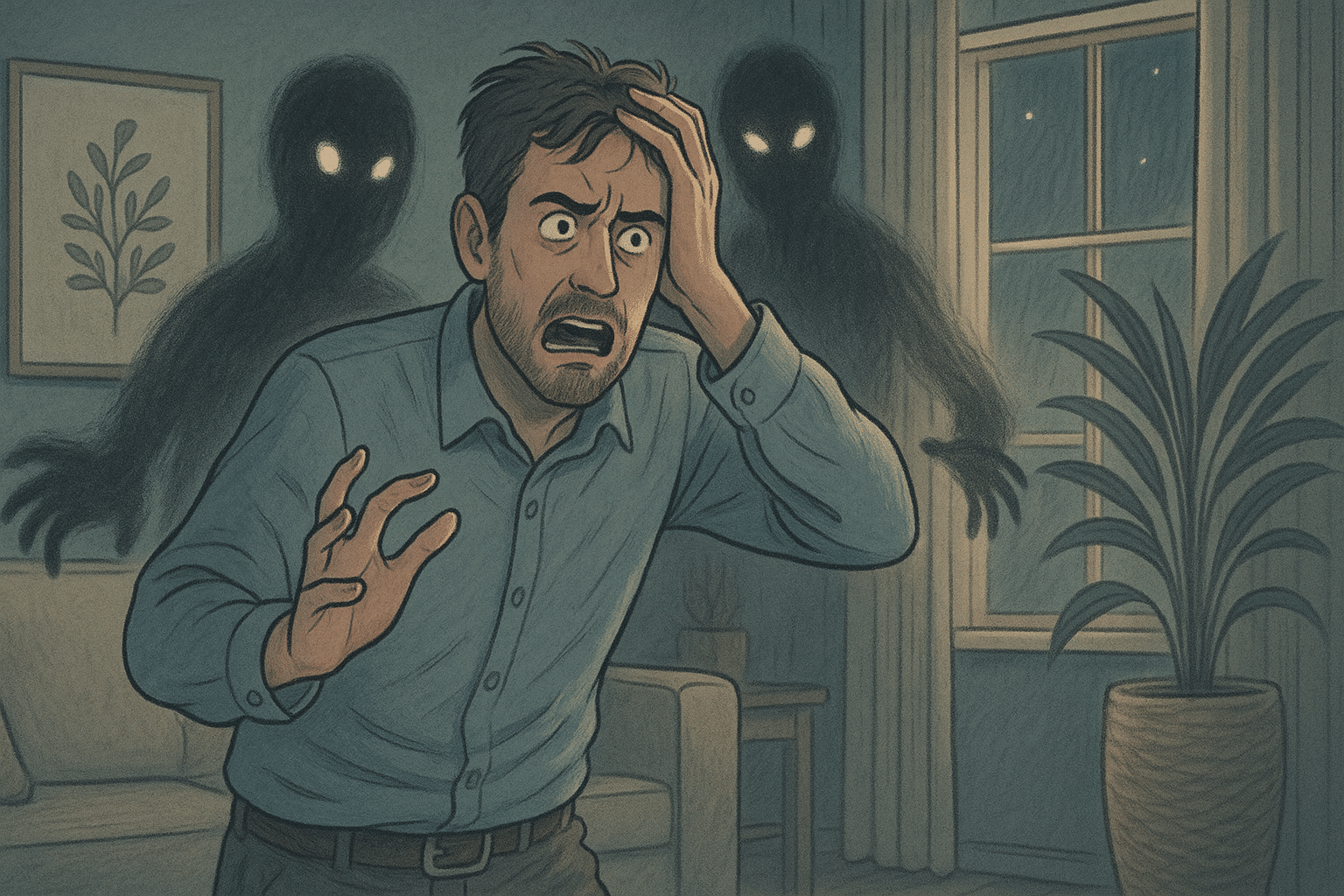Key Takeaways
- Psychotic disorder due to another medical condition occurs when physical health issues trigger psychotic symptoms like hallucinations or delusions.
- Unlike primary psychotic disorders, these symptoms have a direct physiological cause and often improve when the underlying medical condition is treated.
- Common medical causes include neurological conditions, infections, metabolic disorders, and autoimmune diseases that affect brain function.
- At A Mission for Michael, our multidisciplinary team specializes in identifying and treating complex mental health conditions, addressing both the underlying cause and resulting psychiatric symptoms for optimal recovery outcomes.
Psychotic Disorder Explained
Psychotic disorder due to another medical condition is characterized by hallucinations, delusions, or other psychotic features that are the direct physiological result of a medical condition.
Unlike primary psychotic disorders such as schizophrenia, these symptoms have an identifiable physical cause. The psychosis develops during the course of the medical condition, and evidence suggests a direct causative relationship between them.
Medical Condition Connection
Medical conditions can impact brain function through various mechanisms, including inflammation, altered neurotransmitter activity, oxygen deprivation, or direct damage to brain tissue. The resulting disruption in neural circuits can trigger psychotic symptoms even in individuals with no prior psychiatric history.
For patients and families, recognizing that psychotic symptoms have a medical origin can reduce stigma and direct attention to appropriate medical interventions. This understanding often provides relief, as it clarifies that the symptoms are not indicative of a primary psychiatric disorder but rather a manifestation of a treatable medical condition.
Differentiating From Primary Psychosis
Distinguishing psychotic disorder due to a medical condition from primary psychotic disorders involves several key differences. The most significant is the presence of an identified medical condition that explains the symptoms. In primary psychotic disorders like schizophrenia, extensive medical workups typically reveal no underlying physical cause.
The onset pattern also differs considerably. Medically induced psychosis often develops suddenly in conjunction with the medical illness, while primary psychotic disorders typically show a gradual onset with prodromal symptoms developing over months or years. Additionally, the symptom profile may have unique features that point toward a medical cause, such as visual hallucinations (more common in medical conditions) versus auditory hallucinations (more typical in schizophrenia).
Founded in 2010, A Mission For Michael (AMFM) offers specialized mental health care across California, Minnesota, and Virginia. Our accredited facilities provide residential and outpatient programs, utilizing evidence-based therapies such as CBT, DBT, and EMDR.
Our dedicated team of licensed professionals ensures every client receives the best care possible, supported by accreditation from The Joint Commission. We are committed to safety and personalized treatment plans.
Key Symptoms

The presentation of psychotic symptoms caused by medical conditions can vary widely depending on the underlying cause, the affected brain regions, and individual factors.
Hallucinations
Hallucinations involve perceiving something that isn’t actually present and can affect any of the senses. In medically induced psychosis, visual hallucinations are particularly common, a notable difference from primary psychotic disorders, where auditory hallucinations predominate. Patients might see people, animals, or objects that aren’t there, often with striking clarity and detail.
Delusions
Delusions in medically induced psychosis often manifest as fixed false beliefs that persist despite contradictory evidence. These can range from paranoid delusions (believing others intend harm) to grandiose delusions (exaggerated sense of importance) or somatic delusions (false beliefs about one’s body). The content may sometimes provide diagnostic clues; for example, delusions centered on body function might suggest an underlying metabolic or endocrine disorder.
Disorganized Thinking
Cognitive disruption is another hallmark of medically induced psychosis. Patients often exhibit thought process disturbances, including loose associations, tangential thinking, or word salad (an incoherent mixture of words and phrases). These symptoms reflect the brain’s compromised ability to organize and express thoughts logically when affected by medical conditions.
Medical Causes
Neurological Conditions

Disorders affecting the brain’s structure or function are among the most common causes of medically induced psychosis.
Neurological conditions like epilepsy (particularly temporal lobe epilepsy) can produce complex psychotic symptoms during or between seizures. Brain tumors, depending on their location, may press on areas involved in perception or thought processing, triggering hallucinations or delusions even when other neurological symptoms are minimal.
Neurodegenerative diseases such as Parkinson’s, Huntington’s, and dementia (particularly Lewy body dementia) frequently present with psychotic features. Traumatic brain injuries can also lead to psychosis, either immediately following the injury or developing during the recovery period.
Metabolic Disorders
Disturbances in the body’s metabolic processes can significantly impact brain function, leading to psychotic symptoms. Conditions such as diabetic ketoacidosis, severe hypoglycemia, thyroid disorders (both hypothyroidism and hyperthyroidism), adrenal dysfunction, and parathyroid abnormalities alter the chemical environment in which the brain operates. These changes can disrupt neurotransmitter systems and neural signaling, manifesting as psychosis.
Electrolyte imbalances, including sodium, calcium, and magnesium abnormalities, can rapidly induce confusion and psychotic symptoms, especially when changes occur quickly. Hepatic encephalopathy and uremic encephalopathy resulting from liver and kidney failure, respectively, can present with prominent psychotic features alongside other cognitive changes.
Infections
Infectious processes affecting the central nervous system can directly trigger psychotic symptoms through inflammation, direct tissue damage, or immune responses. Encephalitis (brain inflammation) from viral, bacterial, or autoimmune causes frequently presents with hallucinations, delusions, and behavioral changes that can initially be mistaken for primary psychiatric disorders.
Meningitis, though typically associated with headache and fever, can also manifest with psychotic symptoms, especially in elderly patients who may not display classic meningeal signs.
Other Medical Triggers
Numerous additional medical conditions can produce psychotic symptoms through diverse mechanisms. Medications, including corticosteroids, antimalarials, antivirals, stimulants, and certain antibiotics, can induce psychosis as a side effect.
Sleep disorders, especially severe sleep deprivation and narcolepsy, may trigger psychotic episodes that resolve with proper sleep management. Less common causes include certain cancers (particularly those producing paraneoplastic syndromes), porphyria, and mitochondrial disorders.
Treatment Approaches

Effective management of psychotic disorder due to another medical condition requires a dual approach that addresses both the underlying medical cause and the resulting psychiatric symptoms.
Treating Underlying Condition
The cornerstone of treatment is addressing the underlying medical cause. When the primary condition improves, psychotic symptoms often diminish or resolve completely.
For infections, appropriate antimicrobial therapy is essential. Metabolic disorders require correction of the specific imbalance, whether through insulin for diabetes, hormone replacement for endocrine conditions, or vitamin supplementation for deficiency states.
Throughout this process, carefully monitor for medication interactions, as treatments for the underlying condition may affect the metabolism of psychiatric medications or have their own neuropsychiatric side effects.
Antipsychotic Medications
While treating the underlying condition, symptomatic management of psychosis is often necessary for patient comfort and safety. Antipsychotic medications may be used temporarily to control hallucinations, delusions, and agitation.
The duration of antipsychotic treatment depends on the trajectory of the underlying medical condition. In many cases, these medications can be tapered and discontinued once the medical issue resolves. However, some patients with permanent brain changes may require longer-term management of persistent psychotic symptoms.
Therapy Options
Psychotherapeutic approaches complement medical treatments by helping patients cope with the psychological impact of their experience. Cognitive Behavioral Therapy can assist in managing residual symptoms and developing reality-testing skills. Supportive therapy provides a safe environment to process the often frightening experience of psychosis and helps patients rebuild confidence during recovery.
Family education and support are crucial components of the treatment plan. This education reduces family stress and improves the home environment for healing.
Expert Care for Medically-Induced Psychosis at AMFM Treatment Centers
At A Mission for Michael, we recognize the complex interplay between physical and mental health in these challenging conditions. Our experienced multidisciplinary team of clinicians specializes in identifying medically induced psychosis, conducting comprehensive evaluations that go beyond surface symptoms to uncover underlying causes.

AMFM provides comprehensive assessment and whole-person treatment for psychosis.
Our integrated approach combines medical expertise with compassionate psychiatric care, ensuring you receive thorough evaluation and personalized treatment plans. We coordinate care between medical specialists and mental health professionals, providing the comprehensive support needed for these complex presentations. Our team monitors psychiatric progress, adjusting treatments as conditions improve.
If you or a loved one is experiencing new-onset psychotic symptoms, especially in the context of medical illness, prompt evaluation is essential. Contact AMFM today to access our specialized expertise in diagnosing and treating psychotic disorders.
Frequently Asked Questions
How can I tell if psychotic symptoms are caused by a medical condition?
Several key features suggest a medical cause rather than a primary psychiatric disorder. These include sudden onset of symptoms, particularly in older adults with no psychiatric history, visual hallucinations, fluctuating consciousness, and psychotic symptoms that correlate with physical illness severity. The presence of neurological signs, recent medical changes, or a temporal relationship between medical illness and psychiatric symptoms also points toward a medical etiology.
What medical tests are needed to diagnose this condition?
Comprehensive evaluation typically includes complete blood count, metabolic panel, thyroid function tests, vitamin B12 and folate levels, and urinalysis. Depending on clinical presentation, additional tests may include autoimmune panels, inflammatory markers, toxicology screening, and specialized tests for rare conditions. Brain MRI or CT imaging helps identify structural causes, while neuroimaging can detect metabolic abnormalities not visible on routine scans.
Can medically induced psychosis be cured completely?
The prognosis depends largely on the underlying medical condition and timing of treatment. Many cases resolve completely when the triggering medical issue is effectively addressed, particularly acute conditions like infections or metabolic disturbances. However, conditions causing permanent brain damage may result in persistent symptoms requiring ongoing management. Early diagnosis and intervention generally yield better outcomes.
How does treatment differ from treating schizophrenia?
Treatment focuses primarily on addressing the underlying medical condition rather than long-term psychiatric medication. While antipsychotic medications may be used temporarily for symptom management, the cornerstone is treating the root cause. This might involve antibiotics for infections, immunotherapy for autoimmune conditions, or metabolic correction for endocrine disorders. Recovery often occurs more rapidly than with primary psychiatric disorders.
How does AMFM approach medically induced psychosis treatment?
At A Mission for Michael, we employ a comprehensive multidisciplinary approach that combines medical, neurological, and psychiatric expertise. Our team conducts thorough evaluations to identify underlying medical causes while providing immediate symptom management. We coordinate care between medical specialists and mental health professionals, ensuring both the physical condition and psychiatric symptoms receive appropriate attention for optimal recovery outcomes.







